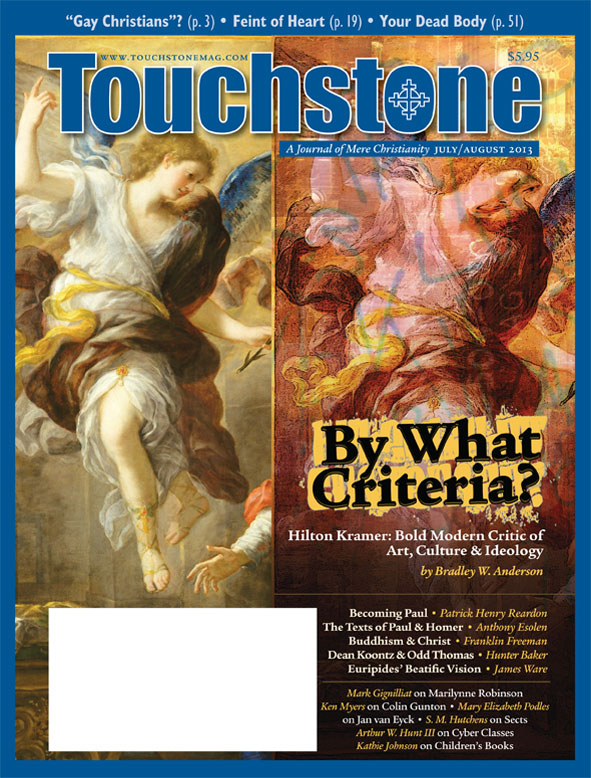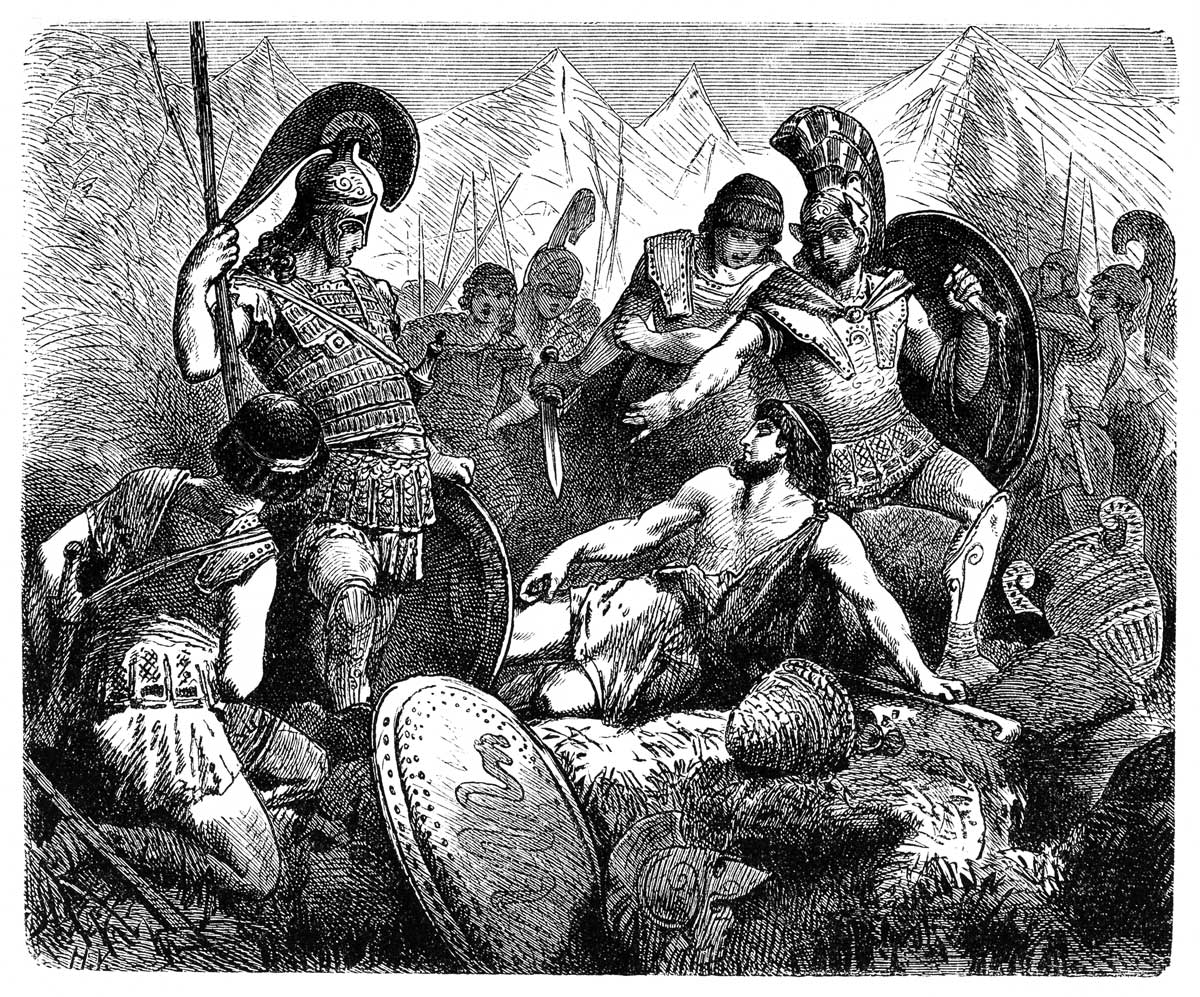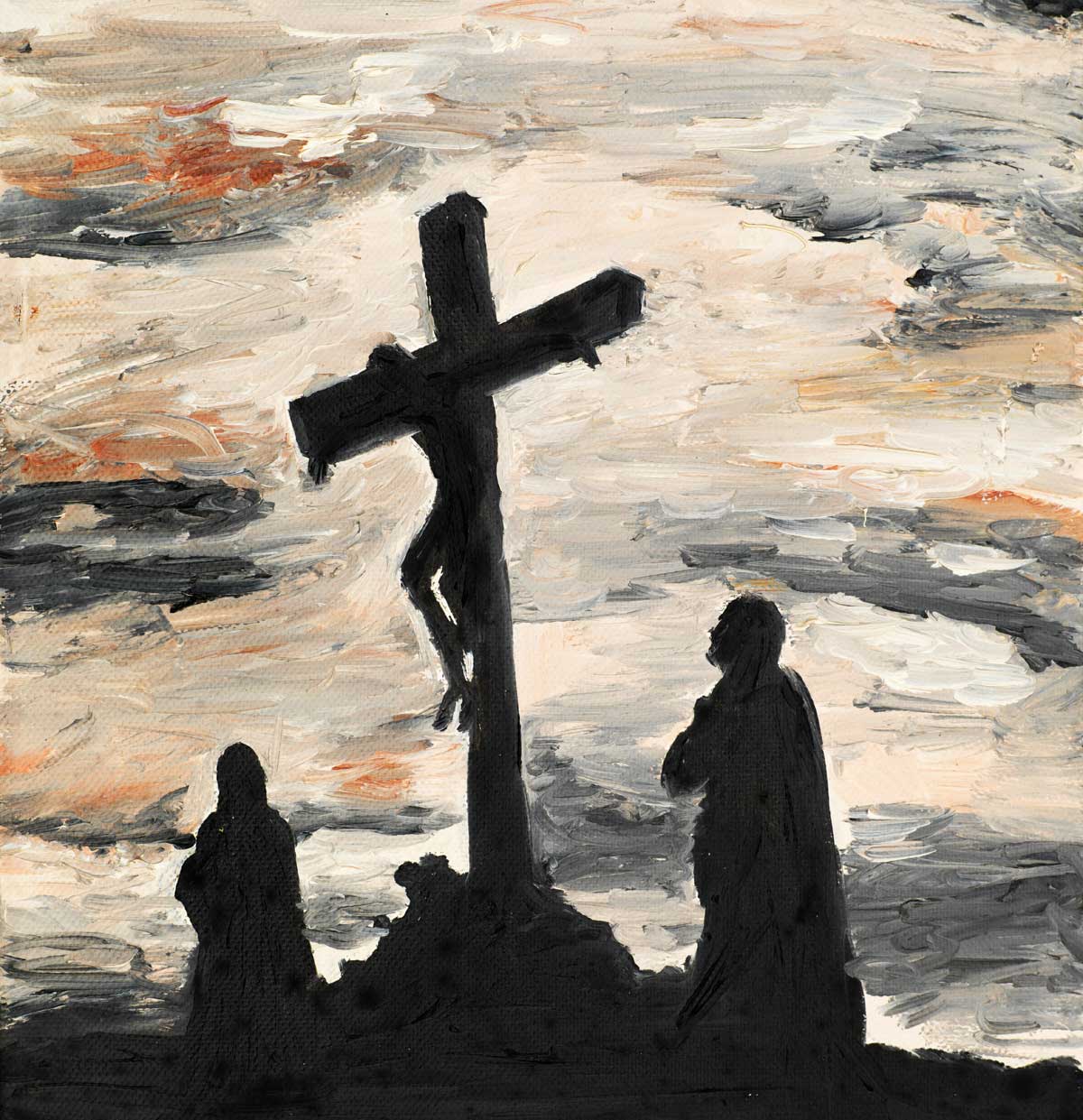Feature
Pauline Scholar, Meet Homeric Scholar
How Textual Analysis Misses Authorial Genius & Literary Inspiration
by Anthony Esolen
I've lately been reading the New Testament at an excruciatingly slow pace: Y traethawd cyntaf a wneuthm, O Theophilus, am yr holl bethau a ddechreuodd yr Iesu eu gwneuthur a'u dysgu, hyd y dydd y derbiniwyd ef i fynu, wedi iddo trwy y Yspryd Glan roddi gorchymynion i'r apostolion a etholosai (Acts 1:1–2).
That's the Welsh translation contemporaneous with our King James Version. I can't yet read Welsh fluently, so that although I "know" what the words mean, I have to reacquire the knowledge piecemeal, puzzling out word by word what the translator was puzzling out, word by word, from the Greek.
The experience has highlighted for me a few truths about the composition and the reading of these texts that we might miss, we who have word processors and books that are friendly to the eye. Books in the ancient world were far more difficult to write and to read. Things we take for granted, such as clear spaces between words, did not exist.
When Augustine called on Ambrose one day, he found him poring over a book in silence, and was amazed—Ambrose suffered from hoarseness and needed to spare his voice, so he took to reading without sounding out the words. Augustine had never seen anyone do that. For the voice assisted the eye in solving the puzzle of letters and words running into one another.
Writing, too, was laborious, even strenuous, so people used secretaries. Internal evidence shows that St. Paul did not "write" the Letter to the Romans, but dictated it to one Tertius, who reveals himself in a greeting (Rom. 16:22). With the cosmopolitan Paul, fluent in Greek, that wasn't going to matter much, but someone whose Greek was wobbly might have his words partly filtered through the syntax of a secretary.
Along with how something is written, the what comes into play, among people who relied upon memory and mnemonic devices. The poems of Homer include metrical tags—Menelaus of the great war-whoop, Agamemnon the lord of men—and detachable passages inherited from many generations past, from the memory of singers. Beowulf is similar; we have material that's centuries old, and words no longer in use when the composer, a Christian monk, wove everything together (and at enormous expense: a hundred sheep for the parchment).
Judgment & Retreat
For a long time, many scholars insisted that Homer's poems were not the work of one man. Others said the same about Beowulf. The dramatic passages—Beowulf bidding farewell to his thanes as he dives into the mere, to seek the lair of Ma Grendel—were too starkly different from the compressed, impersonal account of the Battle at Finnsburh. Ezra Pound grouched that monks had snapped up such splendid "pagan" poems as The Wanderer and The Seafarer and appended lame homilies to them. Others divined two authors of the magnificent Dream of the Rood, whose first half is chock-full of hypermetric lines, muscular and bold, as when the Cross tells of how Jesus came to Calvary:
Then the young Hero ungirt himself; / that was God almighty—
strong, stiff-willed, / and strode to the gallows,
climbed stout-hearted in the sight of many; / intended to set men free.
I trembled when the bold Warrior embraced me, / yet I dared not bend to the earth,
fall to the ground for fear; / to stand fast was my duty.
Too glorious to be the work of the same man who wrote these singsong didactic verses a hundred lines later:
Now, my dear man, / this duty I give you,
that you say to men / what you have seen tonight,
unwind in words / that it is the wood of glory,
the same that almighty God / suffered upon
for mankind's / many sins
and for Adam's / ancient deed.
For similar reasons, scholars doubted the authenticity of some of Shakespeare's works. Eliot called Titus Andronicus "one of the stupidest and most uninspired plays ever written, a play in which it is incredible that Shakespeare had any hand at all, a play in which the best passages would be too highly honored by the signature of [George] Peele," a bombastic and silly playwright, contemporaneous with Shakespeare's early years.
But all these judgments are in hasty retreat. Most scholars now posit a single author of the Odyssey, composing his own verses, or playing changes upon verses he had inherited, as Bach wove motifs from older hymns into his chorales. There's less agreement that he was the same man who composed the Iliad, but most concede that he may well be. Beowulf is now held to be the work of one genius. Ezra Pound's view of The Wanderer and The Seafarer has been rejected. The Dream of the Rood is read as one coherent work. And nobody doubts that Titus Andronicus is, alas, Shakespeare's own.
Four by One
What happened? Here's what didn't happen: algorithmic linguistic analysis. For that's not going to work, if any of the following holds true:
• Our author possesses an immense range.
• A long time, with upheavals in the author's life, separates one text from another.
• He impersonates others, or adopts an archaic or foreign style.
• He interpolates and adapts older material.
• His "style" is filtered through a secretary.
• He uses more than one style, for different situations or genres.
Consider these four Renaissance plays:
Play One is almost entirely in prose (92 percent). It's a bourgeois comedy, an easy success on stage, but there's nothing profound about it. Its rare verses are workmanlike. The character who most frequently speaks in verse, a young man in love, is pallid and forgettable.
Play Two is almost entirely in verse (98 percent). It's a historical tragedy. It, too, is an easy success on stage, and features one of the greatest villains in all of drama. It delves into the profundities of a soul caught in evil. Its verse ranges from brilliant to bathetic. Some of the speeches are longish set pieces, which a good reader can detach from the scene and declaim in their own right.
Play Three is written mainly in prose (74 percent), vigorous and barbed. It's a comedy with strong tragic overtones. Its verses are undistinguished, but its principal lovers are fresh and unforgettable.
Play Four may be the greatest tragedy ever written. It features strong prose (28 percent) and poetry that only Sophocles at his greatest could touch (67 percent). Yet it is difficult to quote from this play, as the verses do not stand apart well from the dramatic situation.
Suppose we had one tattered book, unsigned, with these four plays in it. Scholars would argue that they could not have been the work of a single author. The differences (and I've named only a few) are too stark. We'd have Authors One, Two, Three, and Four, the authors of The Merry Wives of Windsor, Richard III, Much Ado About Nothing, and King Lear. We'd place them in chronological order, assuming that Merry Wives must precede the much superior Ado (it came later). Shakespeare's other plays, if we didn't know from external evidence who wrote them and when, would suffer similar fates. The archaisms of Pericles would suggest that it was early (it is late). Nobody who had written Richard III could follow it with Titus (he did). Nobody who had descended into the prosy cynicism of Timon of Athens could give us the hope-filled play of resurrection, The Winter's Tale (but it was the same person).
All Wrong Assumptions
It's dangerous to assume "evolution" in the style or thinking of an author, much less in that of contemporaneous authors who may influence one another. Here are two Renaissance sonnets, each typical of the author in question, authors of the first rank:
Alas, have I not pain enough, my friend,
Upon whose breast a fiercer grip doth tire
Than did on him who first stale down the fire,
While Love on me doth all his quiver spend,
But with your rhubarb words you must contend
To grieve me worse, in saying that desire
Doth plunge my well-formed soul even in the mire
Of sinful thoughts, which do in ruin end?
If that be sin, which doth the manners frame,
Well stayed with truth in word, and faith of deed,
Ready of wit, and fearing nought but shame:
If that be sin, which in fixed hearts doth breed
A loathing of all loose unchastity,
Then love is sin, and let me sinful be.Long while I sought to what I might compare
Those powerful eyes, which lighten my dark spright,
Yet find I nought on earth to which I dare
Resemble th' image of their goodly light.
Not to the sun: for they do shine by night;
Nor to the moon: for they are changed never;
Nor to the stars: for they have purer sight;
Nor to the fire: for they consume not ever;
Nor to the lightning: for they still persever;
Nor to the diamond: for they are more tender;
Nor unto crystal: for nought may them sever;
Nor unto glass: such baseness mought offend her;
Then to the Maker self they likest be,
Whose light doth lighten all that here we see.
Each poem is a piece of rhetoric, but the first is far more intricate. Some unknown advisor tries to persuade the young man that he's allowing himself to be overruled by passion, and the fellow replies in a series of if-conditions, leading to the climax, that if all these things are sins, then love is sin, and let me be a sinner! But the reader should know better than to accept the youth's interpretation of his love affair. The if introduces uncertainty: what if this love does not involve a loathing of all loose unchastity?
By contrast, the rhetoric and the ladder-climbing of the second poem are simple, almost childlike. The poet pretends to have been thinking of a good metaphor to describe the eyes of his beloved. He praises her by dismissing eight objects in turn, with exactly the same syntax, and concludes that her eyes must be likest to God himself, and to the light he sheds upon us.
If we didn't know better, and if we had a hundred poems like the first and another hundred like the second, we'd assume that the author of the first, Philip Sidney, came later than the author of the second, Edmund Spenser. We'd assume an "evolution" in poetic tradition. We'd see that Sidney is much closer to John Donne, who wrote in the early seventeenth century, than Spenser is, who died in 1599. We might conclude, too, that Spenser hadn't read Sidney's work, or, if he had read it, was not much influenced by it. We'd suppose also that the entire works whence these sonnets come would bear the same relation to one another as the sonnets do: that Spenser's Amoretti and Epithalamion must be a far less complex work of art than is Sidney's Astrophil and Stella.
We'd be wrong on every count. Spenser's work is later than Sidney's by about fifteen years. Spenser admired Sidney and was deeply influenced by him. And the Amoretti and Epithalamion is as complex a work of art as one can imagine.
What happened to change the minds of scholars of "unsigned" poetry? It's simple. They ceased to impose modern ideas about what authors and readers do, and what a poem or a play should look like. Surface inconsistencies resolved themselves in harmony.
What Analysis Can't Tell Us
Linguistic analysis alone is pretty good at telling us, within a century, when something was written, and at confirming that the man who wrote Richard III also wrote Macbeth. It's not very good for establishing chronological order within a century, nor for confirming that the man who wrote one thing did not also write another. On linguistic analysis, apart from authorial affirmation, we can determine that the author of the Gospel of Luke is also the author of Acts. But beyond such a conclusion we dare not go with confidence. We cannot say that one author could not have written Romans and Ephesians, which are a foot or two apart, as compared with the furlong that separates the author of the first part of The Dream of the Rood from the same man when he's writing the second part, the mile that separates Milton's satirical sonnets from the sweet Il Penseroso, and the light year that separates The Merry Wives of Windsor from King Lear.
This was borne home most powerfully as I struggled to read the unfamiliar Welsh, as the words translated what for some of the authors of the New Testament and for many of the readers was part-familiar Greek. I imagined St. Paul conceiving a treatise on law and grace. Perhaps he's heard of a controversy that way, in the church at Rome. He's not been to Rome, but he knows some of the people there, and appends a greeting at the end. Meanwhile, after a short greeting and introduction, he writes or dictates his treatise, without mentioning anything specifically Roman. He must concentrate upon the ideas, at all costs.
He concludes that treatise with a blessing: "Now the God of all hope fill you with all joy and peace in believing, that ye may abound in hope, through the power of the Holy Ghost" (15:13). He turns briefly to his ministry and his travel plans. Then he says goodbye. Then someone else shows up and wants to add a greeting. So he writes or dictates some more. He says goodbye again (there's no delete button). Then Timothy comes by, and Tertius adds his greeting, and so do Gaius and Erastus. Then Paul says goodbye a third time, and adds a final doxology, giving glory to God only wise, through Jesus Christ.
Now then, that great inner Letter to the Romans, from 1:16 to 15:13, what in the New Testament does it most resemble? It's filled with references to the Old Testament, which Paul interprets systematically, showing that they point toward Christ and toward works of faith, not works of the law. If we put it like that, the answer's easy. It most resembles the Letter to the Hebrews, which does the same thing, with sweeter poetry. Yet that's the one "Pauline" epistle whose author does not identify himself as Paul.
I don't argue that Paul wrote the Letter to the Hebrews. Perhaps he did; perhaps he didn't. But if we cannot establish the non-Pauline authorship of that letter, it seems far less likely that we can establish the non-Pauline authorship of Colossians or Ephesians or the letters to Timothy and Titus. For there, all the internal evidence—what the author says about his situation—points toward Paul, unless we apply extra-scriptural assumptions about what Paul would have written to the Ephesians, or about what the Church must surely not yet have looked like when Paul was imprisoned in Rome.
On Thin Ice
Here we must remind ourselves how strange all of the Gospels and many of Paul's letters really are. We can't conclude much about them from similar contemporaneous works, because there weren't any then, and there aren't any now. Nothing is like any of the canonical Gospels, and nothing is close. Nothing, before Paul, was like his letter to the Romans. Why should we be surprised? These unique texts describe an absolutely unique person—his like is nowhere to be found in literature—and a unique event, and a unique historical revolution, spurred by unique transformations of ordinary men and women, witnessing to their faith in unique and astonishing ways.
But Paul was a literary genius. Can't we use genius to determine what Paul did not write? Or to determine what was beyond the linguistic capacity of the evangelist John? No, not unless we have enough works to establish the author's level, and even then we're on thin ice. Shakespeare did write Titus Andronicus. Or rather, the melodramatic clod who wrote Titus Andronicus also wrote Macbeth, Othello, Hamlet, and King Lear.
Not the Unity We Expect
Suppose we had nothing but the disiecta membra of a Renaissance play about Doctor Faustus. Whole scenes present us with poetry of the highest order:
Stand still, you ever-moving spheres of heaven,
That time may cease, and midnight never come.
Fair nature's eye, rise, rise, again, and make
Perpetual day; or let this hour be but
A year, a month, a week, a natural day,
That Faustus may repent and save his soul!
O lente, lente currite, noctis equi!
The stars move still, time runs, the clock will strike,
The devil will come, and Faustus must be damned.
Oh, I'll leap up to my God! Who pulls me down?
See, see, where Christ's blood streams in the firmament!
One drop would save my soul, half a drop, ah, my Christ!
"Only Shakespeare could have written those lines," says Professor Erudite. "They come late in his career, after he had read King James' book on demonology, during that dark period that produced Macbeth, another work whose hero drew too near to the powers below. Linguistic evidence," he continues, "confirms our suspicion, since only the late Shakespeare would dare write those final two lines, hypermetric, bursting the bonds of pentameter just as Faustus attempts to burst the bonds of his pledge to Mephistopheles."
Then Professor Erudite finds scenes, mainly in dull prose, wherein Faustus or a flunky engages in slapstick shenanigans, cheating a hostler by selling him a horse that turns into a bundle of hay, slapping the pope upside the head, and so forth. "These ridiculous scenes were added," says the professor, "by a theater company wishing to make quick money, to please the rabble. They cannot have been by the same hand."
We do have extra-textual evidence that some such scenes were added to Doctor Faustus. But some were original, too. Nor were they written by Shakespeare, but by another genius, of much narrower range, Christopher Marlowe. He's responsible for both the great poetry and the pratfalls. Didn't he know better? Ah, but he did know what he was doing; it's we who will never know what he was doing, unless we give up our notion of what a tragedy must look like.
Return to Faustus' magnificent lines, as the clock nears dead midnight and damnation. Look at the schoolboy Latin: Lente, lente currite, noctis equi! Run slowly, slowly, ye horses of the night! The line is from Ovid, and the context is comic. The lover has what he wants, and is begging the night to ride her chariot slowly, so that he can enjoy his mistress all the longer. That's a piece of brilliant irony. For Faustus has traded his soul for twenty-four years spent, not in acquiring deep knowledge, as he'd proposed, but in foolishness, cheap parlor tricks, and the lusts of the flesh. Such are the wages of sin.
In other words, that single line, if we understand it aright, reveals why the slapstick scenes are there to begin with—and that Marlowe never intended to create some grimly admirable Faustus, to delight world-weary moderns withal. The work possesses artistic and intellectual unity, but not the unity we expect. Marlowe's whole conception of a play is different from ours.
What's Possible & What Matters
So too, what we want from a Gospel of Mark may be quite different from what Mark wanted, or Peter, whose reminiscences it may preserve, or the early Christian communities. We might expect that an author who had a text in front of him would add to it to compose his own; that's why Matthew must be later than Mark. But what makes us so sure?
I can imagine Peter saying, "Let me give you the miraculous events I witnessed directly or by immediate report. We can work from what our friend Matthew has written, and I'll add details of my own. Let's conclude with the fact of the resurrection—just as the door to the sanctuary opens, so to speak. Yes, I think that would be the right place to end." That would account at once for the omissions and the additions.
Did it happen? I don't know. Does it matter, to the believing Christian? We shouldn't let it matter; the Scriptures are the word of God, who has ordained that they should be as they are.
But it could have happened. Any number of things could have happened. I do want to stress that. Many editors of the Bible seem to delight in denying that John wrote John or that Paul wrote Paul, to make the ordinary Christian scratch his head and say, "I never knew!" Take it with a pillar of salt. They claim to know what they cannot possibly know with anything approaching a high degree of probability. I say this not as a textual scholar of Scripture, but as a teacher of literature.
Anthony Esolen is Distinguished Professor of Humanities at Thales College and the author of over 30 books, including Real Music: A Guide to the Timeless Hymns of the Church (Tan, with a CD), Out of the Ashes: Rebuilding American Culture (Regnery), and The Hundredfold: Songs for the Lord (Ignatius). He has also translated Dante’s Divine Comedy (Random House) and, with his wife Debra, publishes the web magazine Word and Song (anthonyesolen.substack.com). He is a senior editor of Touchstone.
subscription options
Order
Print/Online Subscription

Get six issues (one year) of Touchstone PLUS full online access including pdf downloads for only $39.95. That's only $3.34 per month!
Order
Online Only
Subscription

Get a one-year full-access subscription to the Touchstone online archives for only $19.95. That's only $1.66 per month!
bulk subscriptions
Order Touchstone subscriptions in bulk and save $10 per sub! Each subscription includes 6 issues of Touchstone plus full online access to touchstonemag.com—including archives, videos, and pdf downloads of recent issues for only $29.95 each! Great for churches or study groups.
Transactions will be processed on a secure server.
more from the online archives
calling all readers
Please Donate
"There are magazines worth reading but few worth saving . . . Touchstone is just such a magazine."
—Alice von Hildebrand
"Here we do not concede one square millimeter of territory to falsehood, folly, contemporary sentimentality, or fashion. We speak the truth, and let God be our judge. . . . Touchstone is the one committedly Christian conservative journal."
—Anthony Esolen, Touchstone senior editor










